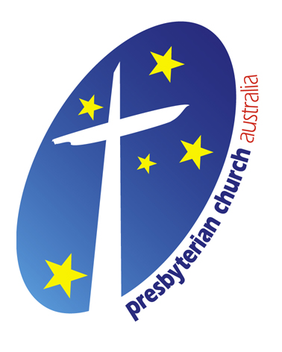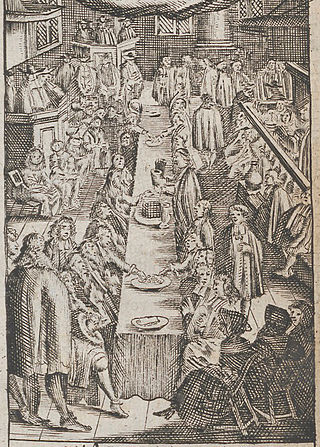Related Research Articles

Reformed Christianity, also called Calvinism, is a major branch of Protestantism that began during the sixteenth-century Protestant Reformation, a schism in the Western Church. In the modern day, it is largely represented by the Continental, Presbyterian, and Congregational traditions, as well as parts of the Anglican and Baptist traditions.

The Christian Reformed Church in North America is a Protestant Calvinist Christian denomination in the United States and Canada. Having roots in the Dutch Reformed Church of the Netherlands, the Christian Reformed Church was founded by Dutch immigrants in 1857 and is theologically Calvinist.

In Christian theology, justification is the event or process by which sinners are made or declared to be righteous in the sight of God.
The Orthodox Presbyterian Church (OPC) is a confessional Presbyterian denomination located primarily in the United States, with additional congregations in Canada, Bermuda, and Puerto Rico. It was founded by conservative members of the Presbyterian Church in the United States of America (PCUSA), who objected to the rise of Liberal and Modernist theology in the 1930s. The OPC is considered to have had an influence on evangelicalism far beyond its size.

The Presbyterian Church of Australia (PCA), founded in 1901, is the largest Presbyterian denomination in Australia. The larger Uniting Church in Australia incorporated about 70% of the PCA in 1977.
The Christian Reformed Churches of Australia (CRCA), formerly known as the Reformed Churches of Australia (RCA) is a Christian denomination established in Australia belonging to the Reformed/Presbyterian tradition.
The Middle East Council of Churches (MECC) was inaugurated in May 1974 at its First General Assembly in Nicosia, Cyprus, and now has its headquarters in Beirut, Lebanon. Initially it consisted of three "families" of Christian Churches in the Middle East, the Eastern Orthodox Churches, the Oriental Orthodox Churches and the Evangelical Churches, which were joined in 1990 by the Catholic Churches of the region. It is a regional council affiliated with the mainstream ecumenical movement which also gave birth to the World Council of Churches, of which the MECC is also a member.

The Democratic Left Movement is a nonsectarian and a democratic leftist political party. It was founded in September 2004 by left-wing and center-left intellectuals and activists some of whom had previously split from the Lebanese Communist Party (LCP) while some were student activists from the "Independent Leftist Groups". The DLM affirms a European-style social democracy—but is open to all forms of leftism and encourages the development of a true secular state. The party operates under a decentralized framework that emphasizes diversity of thought for a progressive society in a liberal democratic environment. It participated in the 2005 Cedar Revolution, a wave of demonstrations against the Syrian occupation of Lebanon, and calls for correcting imbalanced relations with Syria.

Stephen Tong is a Chinese Indonesian Reformed pastor, evangelist, teacher, and musician. He heads the Reformed Evangelical Church of Indonesia, which houses the megachurch Messiah Cathedral, and is the largest Christian Church building in Southeast Asia. He has preached in countries around the world, and guest lectured at theological seminaries and schools.
In Protestant Christianity, the relationship between Law and Gospel—God's Law and the Gospel of Jesus Christ—is a major topic in Lutheran and Reformed theology. In these religious traditions, the distinction between the doctrines of Law, which demands obedience to God's ethical will, and Gospel, which promises the forgiveness of sins in light of the person and work of Jesus Christ, is critical. Ministers use it as a hermeneutical principle of biblical interpretation and as a guiding principle in homiletics and pastoral care. It involves the supersession of the Old Covenant by the New Covenant and Christian theology.

More than 70% of the population of Botswana is Christian. Most are members of the Anglican, United Congregational Church of Southern Africa, the Methodist Church of Southern Africa, and African independent churches. Anglicans are part of the Church of the Province of Central Africa. The Roman Catholic Church includes about 5% of the nation's population.
The Sudanese Reformed Presbyterian Churches (SRPC) are a unified body of Protestant Churches in Sudan.
The term Protestant ecclesiology refers to the spectrum of teachings held by the Protestant Reformers concerning the nature and mystery of the invisible church that is known in Protestantism as the Christian Church.

The Reformed Evangelical Church of Indonesia, abbreviated GRII, also Indonesian Reformed Evangelical Church (IREC), is a Reformed Christian church that is headquartered in Jakarta, Indonesia. It was founded by Stephen Tong, a Chinese-born Indonesian evangelist.
The Africa Gospel Unity Church was founded in 1964 by an untrained pastor who left the National Holiness Mission. The Africa Gospel Unity Church adheres to the 1689 Baptist Confession of Faith. Most congregations are in rural areas. The church's leadership is all-male. In 2004, there were 3,500 members in eighty congregations and eighty house fellowships.

Indonesian Bethel Church or Bethel Full Gospel Church of God abbreviated as GBI is a group of Christian Pentecostal churches in Indonesia. It is a member of Church of God. The headquarters of the organisation is in Jakarta.

In Reformed theology, the Lord's Supper or Eucharist is a sacrament that spiritually nourishes Christians and strengthens their union with Christ. The outward or physical action of the sacrament is eating bread and drinking wine. Reformed confessions, which are official statements of the beliefs of Reformed churches, teach that Christ's body and blood are really present in the sacrament and that believers receive, in the words of the Belgic Confession, "the proper and natural body and the proper blood of Christ." The primary difference between the Reformed doctrine and that of Catholic and Lutheran Christians is that for the Reformed, this presence is believed to be communicated in a spiritual manner by faith rather than by oral consumption. The Reformed doctrine of real presence is called "pneumatic presence".
References
- ↑ "Today in OPC History: Victor Atallah". Orthodox Presbyterian Church . Retrieved 13 November 2023.
- ↑ Nelson, Jim (25 March 2006). "Medium and message". World . Retrieved 13 November 2023.
- ↑ Renwick, A. M.; Harman, Allan M. (2020). The Story of the Church: 4th edition. Inter-Varsity Press. p. 203. Retrieved 13 November 2023.
